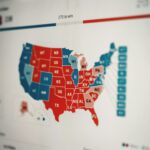Reads of the Week: Ranked Choice Voting, Deceptive Data, and Expanding Internet Access
Each week, we’ll be featuring opinion pieces from the alumni and current participants of AF’s Writing Fellows Program. A few highlights from the past week are below. Do you dream of having bylines like these? Learn more about how the Writing Fellows Program can help boost your writing career!
New York’s Mayoral Race Shows that Ranked Choice Voting Works -Even with Snafus by Elayne Allen (Spring 2018) in TIME
After an embarrassing administrative gaff, a few zany candidates, and nationwide anticipation, New York City’s final vote tally for the mayoral primaries is in. Eric Adams won the Democratic contest and will face off with long-shot Republican nominee Curtis Sliwa for Gracie Mansion. Both candidates were selected by ranked choice voting—the city’s first mayoral election that used this unconventional but promising voting system.
Both Adams and Sliwa ran on law-and-order as central themes of their campaign. Over the last year New York City has witnessed an uptick in gun violence and hate crime. Brazen crimes, including one in Times Square that wounded a 4-year-old girl, heightened bipartisan voter anxiety about violence in the Big Apple. Adams’ and Sliwa’s campaigns spoke to voters’ concerns…
Three ways that data may be deceiving you by Steven Zhou (Summer 2020) in the Washington Examiner
That pretty graph you just saw? It may not be as trustworthy as you think. We live in a modern world where data lives supreme, and “evidence” in the form of numbers is widely accepted as truth. Data visualizations, even on contentious topics such as COVID-19, are now widely available to the public. Chartr sends a weekly newsletter communicating news updates purely through charts and graphs, and the Reddit sub r/dataisbeautiful has 15.9 million members and is growing.
However, the problem is that data sets are not infallible. Specifically, the presentation of data in the form of visualizations shouldn’t be considered as undeniable truth. Numbers can lie as well, and poorly done visualizations can easily mislead readers…
What the FCC Should Focus on Instead of Net Neutrality by Eric Peterson (Fall 2014) in RealClearPolicy
President Biden recently released an executive order that among other items encourages the Federal Communications Commission to “Restore Net Neutrality rules undone by the prior administration.” This would not only be a mistake in terms of closing the digital divide, another stated goal of the administration, but would push the FCC away from important work that actually could close the digital divide — freeing up wireless spectrum.
The current bipartisan infrastructure proposal in the Senate sets aside $65 billion for broadband infrastructure. The funding mechanism for this infrastructure is using the auction proceeds from spectrum used for 5G…




